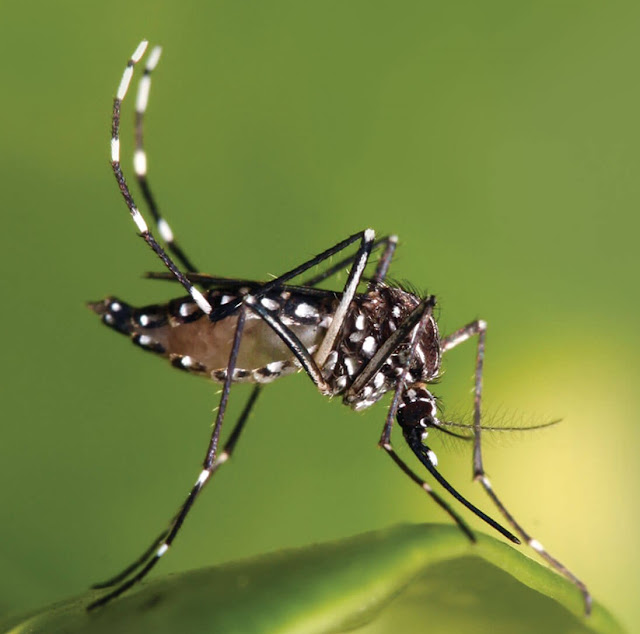Mosquitoes
(or mosquitos) are members of a group of almost 3,600 species of small flies
within the family Culicidae (from the Latin culex meaning "gnat"). The word "mosquito" (formed by mosca
and diminutive -ito) is Spanish for "little fly". Mosquitoes have a slender segmented body, one
pair of wings, one pair of halteres, three pairs of long hair-like legs, and
elongated mouthparts. The mosquito life cycle
consists of egg, larva, pupa, and adult stages. Eggs are laid on the water
surface; they hatch into motile larvae that feed on aquatic algae and organic
material. These larvae are important food sources for many freshwater animals,
such as dragonfly nymphs, many fish, and some birds such as ducks. The adult females of most species have
tube-like mouthparts (called a proboscis) that can pierce the skin of a host
and feed on blood, which contains protein and iron needed to produce eggs.
Thousands of mosquito species feed on the blood of various hosts — vertebrates,
including mammals, birds, reptiles, amphibians, and some fish; along with some
invertebrates, primarily other arthropods.
There
was a time when ‘mambalam mosquitoes’ were famous – now you have them in every
area - be it – Triplicane, Mylapore, Medavakkam, Madipakkam, Parrys,
Velachery – name any area – most popular myths have been exploded – they
are found on every floor of very tall structures too. All mosquitoes must have
open or stagnant water to complete their life cycle. This water can range
in quality from melted snow water to sewage effluent and it can be in any
container imaginable. Male mosquitoes do not bite. The real risk is from female mosquitoes that
search for blood to provide protein for their eggs. Scientific research over the years has shown that female mosquitoes find
their prey using a combination of sensory cues including light, shape, colour,
heat, vibration, sweat and other by-products of human activity.
The
World Health Organisation has expressed fears about an impending second
disaster of water-borne diseases in Pakistan in the wake of devastating floods
that has wreaked havoc in several parts of the country. In a statement issued by the WHO chief Tedros
Adhanom Ghebreyesus, the global health watchdog said that water supply was
disrupted in flood-hit areas of Pakistan, forcing people to drink unsafe water
which could cause cholera and other diseases. The WHO has cautioned people
across flood-hit areas of Pakistan, precisely the worst affected Sindh province
to be extra careful. Tedros on Saturday
highlighted that stagnant water serves as a breeding ground for mosquitoes and
spreads vector-borne diseases such as malaria and dengue and urged donors to
continue to respond generously to save lives and prevent more suffering.
Situation in Pakistan
continues to be grim as the devastating floods have caused havoc in the
country, precisely Balochistan and Sindh provinces. At least 1,545 people have been killed due to
the floods across Pakistan and an estimated 16 million children impacted. Following these,
the Pakistan government recently gave a nod to the country's health ministry to
procure 6.2 million mosquito nets from India, in a bid to protect the public
from vector-borne diseases after the last month's devastating floods that
killed more the 1,600 people.
"Malaria is
spreading at a rapid pace in 32 flood-affected districts of the country where
thousands of children are infected with the mosquito-borne diseases,"
Pakistan health officials were quoted as saying by The News International. The
Pakistani officials said the emergence of malaria in flood-ravaged areas
compelled the country's health ministry to seek permission to procure mosquito
nets from India last month. "The
Global Fund will provide financial resources to the World Health Organization
(WHO) to procure mosquito nets from India for the flood affectees in
Pakistan," they added.
The Pakistani
officials said they are planning to obtain the nets as early as possible and
are hopeful that these would be obtained by the mid of November via the Wagah
route.
WHO Director-General
Tedros Ghebreyesus said that health centres had been flooded, their supplies
damaged and people had moved away from their homes. "Government and
partners are providing safe drinking water and access to toilets to lower the
risks of disease from dirty water. WHO has provided water purification kits and
oral rehydration salts to manage diarrhoeal diseases. Partners are also helping
ensure safer housing and bed nets to protect against mosquitoes and the diseases
they carry," the WHO chief said in a statement.
Earlier this month,
the United Nations launched the revised flash appeal of USD 816 million to
respond to the needs of people affected by climate-induced floods in Pakistan.
Sooner, Indian nets
would be protecting Pakistani people !
19th Oct 2022.


No comments:
Post a Comment